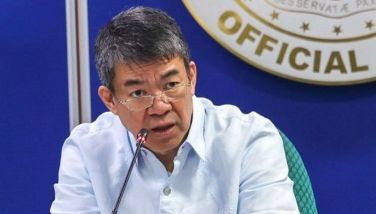Peace at any price?

It is difficult not to rejoice when a peace agreement is signed between warring groups. I join all Filipinos who hope that with a signed agreement, there will be peace in Mindanao.
Although I regret to add that it is marred with the intent of propaganda for the incumbent government that has done so little for the rule of law and the welfare of its millions of poor in every part of the country. Isn’t it a coincidence that just before the signing of the CAB, the Tiamzons of the CPP-NPA-NDF were finally arrested?
Worse, initial steps that led to it — included a failed election through PCOS machines and the corruption of the Legislature, I think, are too high a price to bring it about. Therefore it carries the seeds of failure. And that includes giving up the Sabah claim forever. How can this government demand arbitration through international law on the conflict on the South China Sea and yet so recklessly cast aside a claim supported by past and present evidence? The promoters of the CAB in pushing for peace has created more enemies because of the way it was handled by this government. That will not escape censure.
To quote Federico Mayor, once director general of UNESCO, “A universal renunciation of violence requires the commitment of the whole of society. These are not matters of government but matters of State; not only matters for the authorities, but for society in its entirety, including civilian, military, and religious bodies. The mobilization which is urgently needed to effect the transition within two or three years from a culture of war to a culture of peace demands co-operation from everyone. In order to change, the world needs everyone.†He was speaking on wider conflicts in the world but it is just as true with the conflict in Mindanao.
* * *
Having said that, the bright side, in my opinion, of the signing is that it may eventually lead to federalism that is increasingly being touted as the solution to the chaos of big governments especially like what we have in the Philippines today. But as it was argued at the 2005 Constitutional Commission created by former president Gloria Macapapagal Arroyo in which I was a member, there is a distinction between the federalist principle and federal government. The federalist principle is a slower process of adjustment to give local governments more say in running their affairs. It is about the principle of subsidiarity that would allow smaller entities like local government the freedom to do what they can do instead of being subject to total control of a central master government. It is not very different to the principle of freedom for the individual against the power and force of government.
Of course, the Bangsamoro is unique for having a history and tradition that demands they should have a homeland of their own where they can practice their religion and culture. The Moros were forced into the colonial capture of the Philippines first by the Spaniards, then the Americans and then Filipinos themselves through several governments that insisted to keep them in control of the North.
The CAB agreement may signal to other regions similarly impoverished by the unitary political structure that if MILF could be given control in managing their region why should they not be given the same. It could open the gates of open rebellion by regional authorities that could have been done more peacefully through constitutional reform. I know for instance that one of the poorest provinces in the country is Bicol despite the fact that they have immense resources that fill up corporate bank accounts in Makati.
With the corruption in government and both legislative and executive officials helping themselves to PDAF and DAP funds, the idea of separating themselves from such governance will not be such a wild idea. So yes, all hail to the CAB and the seed of federalism that it has planted for restructuring the entire country.
* * *
I had the opportunity to talk with former Speaker Jose de Venecia. He was entertaining Gozde Dizdar, who is active in Turkish politics. We all met in a recent trip to Azerbaijan and kept contact.
Speaker JDV has carved an international political career for himself but he still continues to be concerned with Philippine politics. He was happy with recent developments and sent word to this column hailing the signing of the GRP-MILF peace accord as the founder of the International Conference of Asian Political Parties (ICAPP).
An official statement from ICAPP came from Islamabad hailing the signing of the peace agreement.
Speaker Jose de Venecia who is known for his work in peace negotiations all over the world through ICAPP, said he hoped that with “the signing of the Comprehensive Agreement on the Bangsamoro (CAB) could promote similar agreements in Pakistan and Afghanistan with the Taliban, the Muslim Rohingya and Buddhist groups in Myanmar, the Buddhist and Muslim groups in Thailand, and other conflict areas in Asia.
The Asian leaders congratulated President Benigno Aquino III and the MILF led by its chair Murad Ebrahim for the long-drawn-out but successful peace pact facilitated by Malaysia under Prime Minister Najib Razak and other Asian and European organizations.
The ICAPP leadership composed of its founding chairman, former five-time Speaker de Venecia; Secretary General Chung Eui-yong of South Korea; Special Rapporteur Sen. Mushahid Hussain Sayed, chairman of the Senate Committee on Defense and Defense Production of Pakistan and Member of Commission on Eminent Persons of the Organization of Islamic Countries (OIC); and Asaf Hajiyev, head of international relations of the ruling New Azerbaijan Party of Azerbaijan, met in the Pakistani capital to prepare for the Standing Committee meeting of ICAPP in Vladivostok, 31 May-1 June 2014, the General Assembly in Sri Lanka, 18-21 September 2014, and the Joint Meeting of ICAPP and COPPPAL, an organization of political parties in Latin America and the Caribbean, in Nicaragua in October this year.
It will be remembered that De Venecia and then President Fidel Ramos worked for the breakthrough in the peace accord between the Philippine government and the Moro National Liberation Front (MNLF) led by Chairman Nur Misuari in 1996.
He hopes that a formula will be found to include the MNLF in the comprehensive Bangsamoro agreement with the MILF.
The ICAPP represents parties in 52 countries in Asia, earlier endorsed the completion of the Philippine government-MILF talks following ICAPP’s meetings and declaration in Mexico, Azerbaijan, East Timor, and China to set an example for other secessionist and insurgency groups in the Asian region and the world.
- Latest
- Trending





























